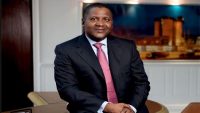In order to address the challenges at the distribution level to be able to take all loads sent out to the national grid, which presently stand at about 5,000MW, the Federal Government through its distribution expansion network programme is committed to ensuring that both transmission and distribution network capacities progress simultaneously, just as it is on course in achieving “our renewable energy policy targets of additional generations to the grid”.
This was made known by the Minister of State, Power, Works & Housing, Mustapha Baba Shehuri, at the 6th Session of the Nigerian-German Bi-National Commission, hosted by the Ministry in Abuja.
According to the Minister “the Nigerian Government is improving the Nigerian Power Sector in terms of generation capacities, grid expansion at both the transmission and distribution levels”, as he recalled that President Buhari’s Administration had inherited a generation capacity of about 4,000MW which has now gone well beyond 7,500MW, with a Transmission capacity of 8,000MW.
Noting that power is a critical element in the development of any nation, Shehuri said if the challenges of the sector were successfully solved, other socio-economic issues would be solved and the high rate of unemployment among the youth would be drastically reduced.
The Minister further stated that the Federal Government is committed to cooperating with Germany on the power sector, as this Administration is passionate about strengthening infrastructural deficits in the country, saying that embedded mini-grid solutions are one of the prospective areas Government is looking forward to working with Germany on.
He advocated on the need to diversify the energy sources from fossil fuel to other energy mix such as hydro, solar, biomass, coal and wind, calling for mini-grid solutions that would be built, within months.
On his part, the State Secretary of the Federal Foreign Office of Germany, Walter Lindner, who was also the Head of the Delegation, said “if energy is not working well, you have stability problems in the country. The essence of the bilateral cooperation is what we can do to have 100% energy. Your country is a very rich country but you have to use your resources wisely. And that is why we are here, to help you”.
Speaking further, he commended Nigeria’s recent programmes in the power sector such as the Power Sector Recovery Plan (PSRP), the Agenda 30-30-30 and the Action Plan for Renewable Energy and Energy Efficiency.
The Working Group had essentially, the followings as its objectives: Promote energy security, Intensify bilateral cooperation in the energy/power sector in the interest of our governments and companies that engage in power activities, as well as Promote the realization of energy efficiency and renewable energies in order to boost our economies and guarantee sustainable environment.
The meeting had in attendance, in the Nigerian part, the Minister of State who chaired the Session, the Permanent Secretary (Power), Ag. Director Renewable & Rural Power Access in the Ministry, as well as Head of Agencies in the Power Sector, On the German side were: the State Secretary of German Federal Foreign Office, who was the Head of the Delegation, the Head of Programme, Nigerian Energy Support Programme, the Cordinator Nigerian – Germany Energy Partnership, the Country Director, Delegation of German Industry and Commerce, the Personal Assistant to State Secretary, the Head of Division for Energy Policy, Federal Foreign Office and a host of others.
Etore E. Thomas
Deputy Director (Press)





